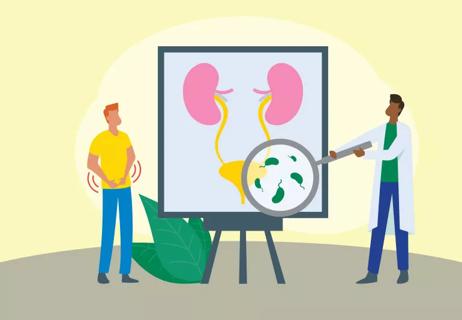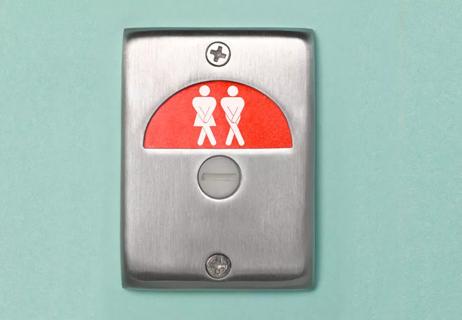Signs to look out for include pain and changes in frequency or urgency

Urinary tract infections (UTIs) are a fact of life for a lot of people. Your risk of developing one increases as you age, making UTIs among the most commonly diagnosed infections in people who are older.
Advertisement
Cleveland Clinic is a non-profit academic medical center. Advertising on our site helps support our mission. We do not endorse non-Cleveland Clinic products or services. Policy
UTIs can affect any part of your urinary tract. That includes your:
“We have a microbiome of normal, healthy bacteria that lives everywhere in our body to help fight off bad bacteria that make us sick. That’s true in the bladder and urinary tract, as well,” says urologist Emily Slopnick, MD. “As we age, that good bacteria can have a harder time fighting off infection for a number of reasons.”
It’s normal for women to develop one or two UTIs each year. But when they appear more often, or when they show up in men, they can be cause for concern.
We talked with Dr. Slopnick about spotting and treating UTIs in older adults.
Dr. Slopnick says the classic symptoms of a UTI are pretty similar for people of all ages. They may include:
While confusion or disorientation are sometimes associated with UTIs in older adults, particularly those ages 70 or older, Dr. Slopnick says it’s important to understand that a UTI doesn’t necessarily come with any signs of confusion. And signs of confusion don’t necessarily point to a UTI.
Advertisement
Aging naturally increases the incidence of confusion and delirium, especially among those who are cognitively impaired, depressed, malnourished or completely dependent.
“If someone is suddenly showing signs of confusion, your doctor may check for a UTI. But confusion alone isn’t a telltale sign of a UTI,” Dr. Slopnick says. “Other causes should be investigated as well, especially if the person isn’t showing other classic UTI symptoms.”
Urinary tract infections can happen to anyone. Women who are post-menopausal are at the highest risk, though. And the risk for UTIs continues to grow as you age. Research shows more than 10% of women over the age of 65 report having a UTI each year. That number increases to almost 30% in women over the age of 85.
Hormones play a big part in that. The hormone estrogen in particular helps keep good bacteria healthy and bad bacteria away, Dr. Slopnick says.
“With good estrogen supply, it’s acidic in the vagina, which helps prevent bad bacterial growth,” Dr. Slopnick explains. “After menopause, estrogen levels drop. That causes the skin and tissue between the urethra and the opening of the vagina to get thinner and drier and lose acidity. So it’s easier for bad bacteria to grow and make its way from the vagina or the perineum into the bladder.”
Additionally, the bladder and pelvic floor muscles can lose some of their strength in older adults, making it harder to empty their bladders completely. Stagnant urine in your bladder is a prime breeding ground for bad bacteria to grow.
In older men, conditions like an enlarged prostate can keep their bladder from emptying fully.
UTIs are also more likely if you:
UTIs are treated with antibiotics. If a UTI is suspected, your healthcare provider will test a urine sample and consider your symptoms and other factors to determine if you need antibiotics.
Dr. Slopnick says a common misconception is that any bacteria found in urine is a sure-fire sign of a UTI and needs to be addressed.
“If your doctor screens your urine and finds bacteria, that can be perfectly fine. If you don’t have other symptoms, we generally do not recommend antibiotics,” Dr. Slopnick states. That’s because it’s common to find bacteria in the urine that isn’t related to an infection.
Urinary bacteria that don’t cause any symptoms are called asymptomatic bacteriuria. This isn’t dangerous to your health.
Treating asymptomatic bacteriuria can lead to antibiotic resistance and make future infections harder to treat. Additionally, antibiotics can create side effects including diarrhea and C. difficile infection.
Advertisement
UTI infections that go untreated can spread from your bladder to your kidneys and beyond. Especially in older adults or anyone with a lowered immune system, treating an infection earlier can keep it from spreading and overwhelming your system.
An infection that goes untreated can lead to sepsis, a serious form of infection. Dr. Slopnick says fear of sepsis is what causes worry about asymptomatic bacteriuria. If you have a UTI, you’ll almost certainly show symptoms long before the infection spreads or sepsis sets in.
The No. 1 way to prevent a UTI is to empty your bladder completely and often. Dr. Slopnick suggests urinating every few hours, whether you feel the need to go or not.
She also recommends these tried-and-true prevention strategies:
Advertisement
If you suspect you or a loved one has a UTI, it’s best to see a healthcare provider. Symptoms like painful, urgent or frequent urination shouldn’t be ignored, Dr. Slopnick stresses.
Your doctor will ask about symptoms and perform a urine culture and possibly other tests to confirm if a UTI is to blame. If you’re experiencing multiple UTIs a year, your doctor may also order other tests to better understand if a prolapsed bladder, enlarged prostate or other condition is causing frequent infection.
Advertisement
Learn more about our editorial process.
Advertisement

Cranberry juice and cranberry pills may prevent future UTIs when taken consistently

Yes, but male UTIs are often the result of another issue like diabetes, prostate problems or kidney stones

Only antibiotics will cure a UTI, but home remedies could help prevent future infections

Staying hydrated and peeing after sex can help prevent this common post-sex condition

A bladder infection is definitely a UTI ... but not all UTIs are bladder infections

Recurrent urinary tract infections are most common in women, seniors

The ins and outs of urinary tract infections

Your tolerance decreases with age, thanks to body changes, health conditions and medications you may take

Wearing a scarf, adjusting your outdoor activities and following your asthma treatment plan can help limit breathing problems

Your diet in the weeks, days and hours ahead of your race can power you to the finish line

When someone guilt trips you, they’re using emotionally manipulative behavior to try to get you to act a certain way